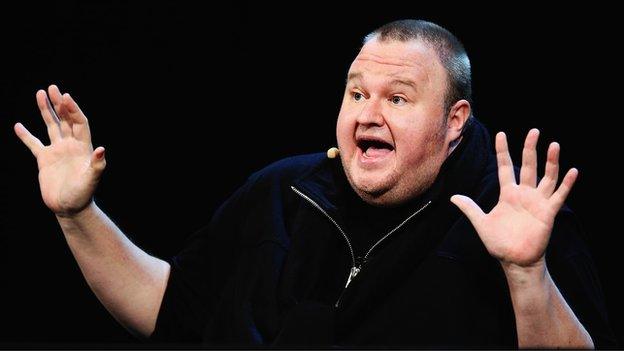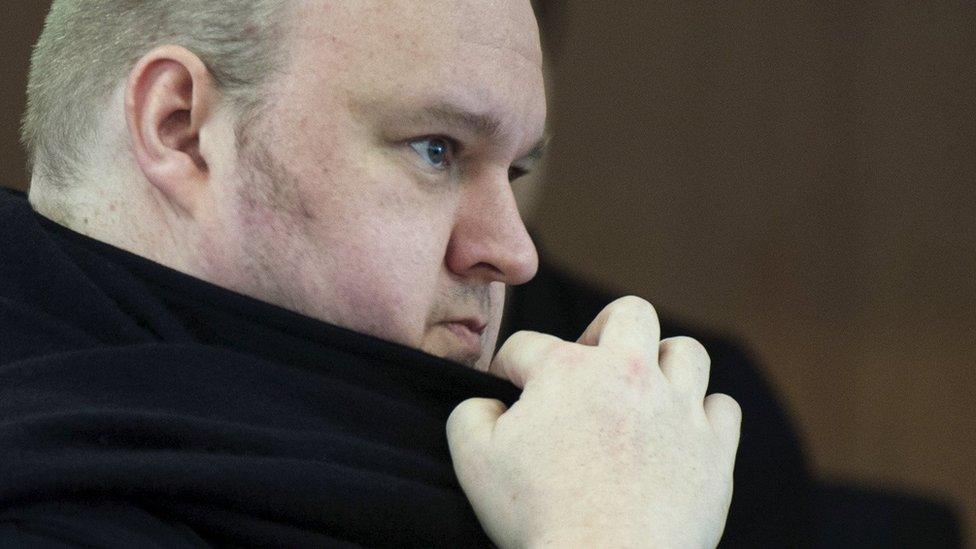Kim Dotcom wins right to livestream extradition appeal
- Published
Kim Dotcom explains why he wanted extradition appeal livestreamed.
A judge in New Zealand has said internet entrepreneur Kim Dotcom will be allowed to stream his appeal against extradition live online.
The founder of the seized Megaupload websites is wanted in the US on charges of copyright infringement, racketeering and money laundering.
The US had opposed his proposal to broadcast the hearing on YouTube.
Dotcom said on Twitter that the decision was "breaking new ground" and streaming would start on Wednesday.

He told the BBC there was a definite public interest in his case.
Dotcom's lawyer said the move was "democracy at its finest".
"It provides everybody in the world with a seat in the gallery of the New Zealand courtroom," Ira Rothken told the Associated Press, saying there would be a 20 minute delay on the live feed.

Analysis, Dave Lee, BBC North America technology reporter
Kim Dotcom has won a major victory here. By getting the hearing livestreamed, he'll hope to expose what he says are some of the incompetencies of this entire case. By bringing the world's technology community into the court room, instead of relying on media reports, he hopes to build support.
Mr Dotcom praised the judge for being "brave" enough to allow the streaming to happen. But it does come with an odd stipulation which many might find a tad naive on the part of the court.
As well as a 20 minute delay, in which some details can be beeped out from what goes out on the internet, the judge has also ruled that once the six-week hearing is over it cannot be kept online forever.
But to think, given all the people likely to watch it online, nobody is going to record it independently and publish shows a poor grasp of how the online community operates. The video of Kim Dotcom's hearing will be all over the internet, in perpetuity, whether the judge wants it to be or not.

German-born Dotcom ran file-sharing site Megaupload.com, which once had millions of users storing files and downloading movies and songs.
The FBI took control of the site and other domain names belonging to the business in January 2012. Federal prosecutors said it had cost movie studios, music labels and other copyright-holders more than $500m (£382m) in lost revenue.
Last December, a New Zealand court ruled that the German-born entrepreneur could be extradited to face charges of copyright infringement, racketeering and money laundering.
But Dotcom's lawyers launched an appeal, arguing that he should not be held responsible for the actions of the site's users, and did not get a fair hearing.

Megaupload was shut down by the US authorities in 2012
US concern
The request for livestreaming came on the first day of the appeal hearing in Auckland, which is expected to last up to eight weeks.
Another defence lawyer, Ron Mansfield, said there were "unprecedented issues of public and international interest" raised by the case and added that coverage should not be limited to traditional media.
Lawyers for the US had said streaming could influence a potential future jury.
The High Court judge, Justice Murray Gilbert, criticised the fact the request had not been made in advance but said he wanted to hear the views of local media outlets before making a decision.

Televised justice
Debate still rages as to whether televising trials is a necessary part of transparent justice or something that turns legal procedure into a circus. But some very high profile cases have been put on camera:
In 1961, the trial of Nazi war criminal was Adolf Eichmann was beamed around the world. It was the first time people heard testimony of death camps from victims themselves. Eichmann was eventually convicted and executed
In 1995, millions saw US football player OJ Simpson acquitted of murder. The judge responsible for televising the trial has been accused of allowing the huge publicity that came with the case to influence his decisions
Pop superstar Michael Jackson in 2005 was found not guilty of sexually abusing a 13-year-old boy
South Africans saw Oscar Pistorius weep in the box during his 2014 trial for the murder of girlfriend Reeva Steenkamp. It was the first time a South African trial had been televised - the judge responsible said he hoped it would dispel misconceptions about justice

- Published11 July 2016

- Published23 December 2015

- Published8 March 2012
